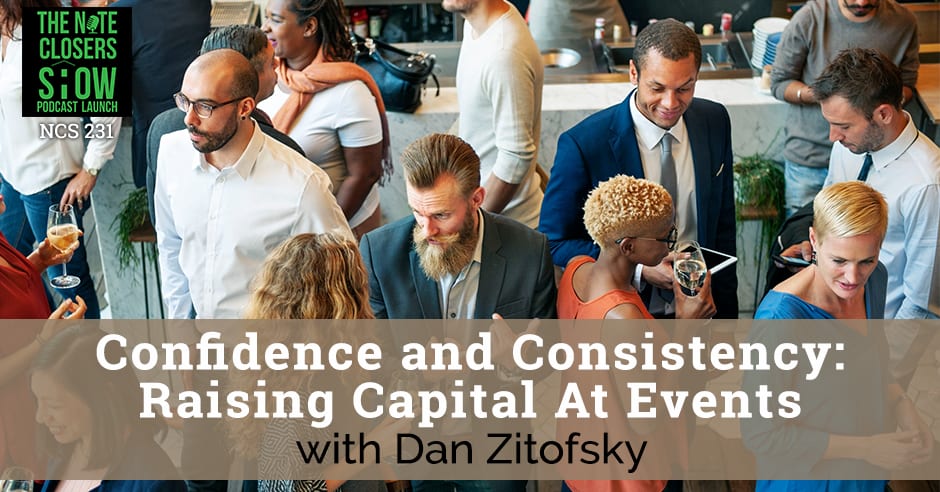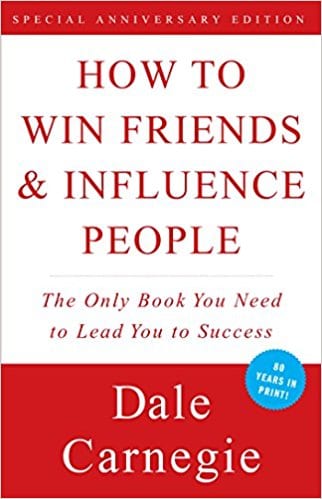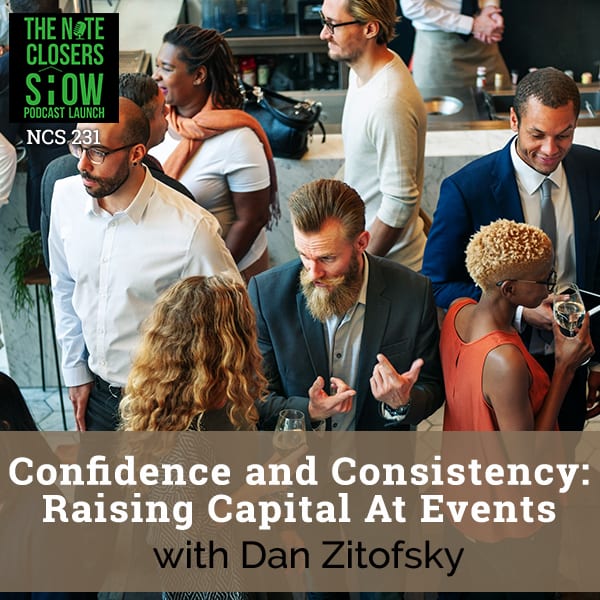
Going to events is the best way to reach out and build a big network. Doing this will mean you can make more deals and close more notes. Real estate investors know that raising capital at events is easy when you present yourself as a professional with a professional business card and elevated pitch. To add to these tips, Dan Zitofsky advises note investors to get out of their comfort zone and speak to people to build relationships. Be an authority in the market by doing your homework. Learn more tips and techniques that can help you personalize your business and make more money.
—
Listen to the podcast here
Confidence and Consistency: Raising Capital At Events with Dan Zitofsky
My guest is our buddy, our brother from another mother, a fellow big-hearted, passionate real estate investor who has a big heart for helping people succeed, our good buddy, Dan Zitofsky. Dan, how are you doing?
I appreciate you having me on. I’m looking forward to it. It’s always good to see you.
I know that you’re busy traveling around, buying deals and making things happen just like we are. I appreciate you taking the time to talk about this subject. When you’ve got us two together, you want to be a fly on the wall because we will tell some stories, we’ll share some nuggets to help make you successful. People see that you, me, Wayne, are always talking about raising capital from events. Whether we’re out speaking somewhere or out just networking, what are some of the things that we’re doing to raise capital? Why don’t you introduce who you are, your cup of tea and your bread and butter play in the real estate industry?
I’m Dan Zitofsky. I run Zitofsky Capital Management. We’re a small private banking institution. We raise capital to acquire non-performing assets and turn them into performing assets, creating wealth by holding a note. Everything we do is based on passive income. We’re not in the business where the note industry really hurts us if people are complaining about notes being priced too high. We create a lot of our own notes, so we’ll create our own gold. That’s really what I do. I’ve been at this for about 29 years now. I’ve done everything from fix and flips to wholesaling to multi-families to land deals, hotel deals, rentals. I still have a lot of rentals but I acquire them because my ultimate goal with each rental is to turn them into a seller-financed deal for an investor. I don’t want to be a landlord. I like to be the bank. That’s ultimately what I do. I have a niche. I look at properties in a certain value in a certain emerging market.
I’m very good about building teams, systems, process and people in certain markets. I’ve heard you say it a million times over, “Don’t go out and spread this cast and try to deal with twenty different areas.” I have a niche of probably about three to six markets and I play in three of them very heavily because that allows me to rinse and repeat, have a great team, be able to take care of my team and just become an expert in that market. Leading into this next topic, a big part of it is when you’re an expert in a market, your investors feel a lot more comfortable playing in that game with you. I see a lot of people out there and I look at what they’re doing and they’re doing deals in Ohio and the next thing I know, they’re in eight different markets and I see deals from eight markets and they have no teams. That’s something you want to do is become an expert in that market.

Raising Capital: When you’re an expert in a market, your investors feel a lot more comfortable playing in that game with you.
As we talk about going to events, we all started in different ways. We’re at different levels and a lot of people are starting off. We’re speaking on stages, we’re going to conferences as the speaker or real estate investment clubs. Let’s talk about what we do now and then we’ll come back and talk about what we do as a beginner. A lot of it builds up on each other but the biggest thing is if you get a chance to speak somewhere, you have to realize that you already are authority because the person that runs that event is giving you credibility for being there. You have to take that very seriously and be respectful of that. Would you agree with that, Dan?
100%, and that’s what will get you speaking. A couple of people that are speaking now, we definitely helped them out get into that speaking circuit. They’ve asked me, “How do you get those speaking circuits?” We don’t ever ask to speak anywhere. In fact, we probably turned down most of the speaking events we get asked to. I know you too. You’re very protective of your time and we both want to be the dumbest person in the room. We could speak 300 times a year if we want to, but you have to be an authority. You have to have ethics and morals. You’ve got to do it the right way when you speak at events.
Let’s talk about when you started off. How did you start raising capital? What did that process look like for somebody who’s brand new? When you go to an event or go to a networking club or a real estate Meetup, what are some tips that you would like to share with people about the best way to raise capital?
Put on your damn diapers and stop being a baby. I say that as a joke but there’s a meaning behind it. Every once in a while, I have friends that run some Meetup groups and meetings and I go and I support certain people that speak. Every once in a while, I’ll speak to give back. Every once in a while you do have to give back to newer people in the industry. I go to the events and I see the same people over and over, sitting at these events because it’s their night out with their wife or their girlfriend or their friends. They don’t network at all. They don’t talk at all. They don’t take action. The one thing you want to do before you go to any event is you want to be professional. When I say that that’s not even on what you have. I’m not worried about websites and all this stuff.
It’s great to have a professional business card and have an elevator pitch. Have that 30-second elevator pitch and know what you’re going to say. When somebody asks you, “What do you do?” because that’s what they’re going to say, “My name is Dan. What is it that you do?” you want to be able to sum it up in 30 seconds so I know if we’re an interest or not and then we can go further from there. Too often, when I go to these events, people come up and ask what I do. I tell them and I ask what they do. They ramble on and when I’m done, it’s a five-minute conversation. I have no idea what they do. Get that elevator pitch down. That’s the most important thing you could do. Have good-looking business cards. Spend a little money on professional business cards. Get the logo done the right way. Don’t go and print your own business cards on paper at home and cut them out. It doesn’t take much money to do stuff like that.
The two things I would say is to get out of your comfort zone and speak to people. Believe it or not, I’m a little bit of an introvert. I don’t like the crowds. I don’t like getting out there and speaking to people. Nobody would believe it but I did in the beginning and that’s how I did it. In the beginning, that’s really what you want to do. You’ve talked to people about putting a portfolio together and you’ve been great by saying, “Use some of the deals we do together, that you’ve joint ventured on. Use some of these deals.” You could do that but in the beginning, you don’t have that, so it all comes down to professional business cards, that 30-second elevator pitch and look presentable when you go and be confident.
I’m a big proponent too of using a good business card and having your face on it. It does cost a little bit extra. Put your face on it because people are going to talk to plenty of people at these events and you want them to remember you and start branding your face with a name. The logo is great but if I didn’t know who it came from, I wouldn’t know who this individual was without knowing their face and talking to them a couple of times. Especially if you’re brand new, put your face on it and get a nice glossy card. You’ve probably seen this happen where somebody has a business card and there are twelve different things on the back of the damn thing.
Be focused. When people see me, they know they can come to me and they’re going to either acquire a turnkey rental or they could joint venture with me on a passive note. That’s what we do. We don’t tell people we fix and flip even though we do a couple of those a year because the numbers just don’t work on properties we get. We don’t talk about the multi-families we buy. When they see us, they know exactly what we do. That’s what’s changed it for us. In the beginning, you tell all the people, “We were doing everything. We were out there doing rentals.” The only time we do rentals now is because we turn these to turnkey rentals. We were doing 30 to 40 flips a year. When I went to somebody and said, “Joint venture with me on a note,” where in the world did this comes from? You’re a flipper. What’s going on with notes? What’s your expertise in that industry? One wonders. It’s about focus. If you had that 30-second elevator pitch down and you know it and you’re confident about it, everyone in the world will go further with you. They’ll say, “Tell me more. Can we meet for coffee or lunch? Can we have a phone call?” Whatever it might be, you’re going to have the open door after that.

Raising Capital: Get out of your comfort zone and speak to people.
Let’s talk about that. You got to an event, you’ve got a good business card, an elevator pitch to people, and you’re talking to people. A big thing is in the follow-up, dropping a personalized email, “It was great meeting you at the last networking event. Would you like to get coffee?” or shooting a text message. It’s all those little things afterwards that are going to help out tremendously. I know when I go to an event, I get a stack of business cards. I still do that to this day. We drop an email out, try within 24 to 40 hours, “It was great meeting you. Here’s a little bit of reminder of what our pitch is. If we can work together, great. If not, at least you know. Maybe if you know somebody who’s looking for what I do, it’s helpful.” You have a bit of a follow-up system too, don’t you, Dan?
We do. We use email marketing campaigns. Every business card I have, if I pull them all up, I’m writing something on every one of them. I’m always writing. What’s important when you’ve got to build these business cards is get these with a back where you can write on it. Don’t get these glossy metal cards where you can’t write on them. I write notes on every business card of somebody I’ve actually spoken to. If somebody hands me their business card, they just go into an email marketing campaign and they’ll just get blasted because I don’t know what we spoke about. I will take notes on every single person’s business card and I’ll follow-up and that’s how I’ll know what they are besides the picture if you have it. We follow up. I used to love to do this. I just don’t have the time to meet everybody for coffee and lunch anymore. It’s not that I don’t like doing it, I just don’t physically have the time. I can’t get anything done in my day if I do that. Once in a while, if it’s local to me and I’m meeting somebody else and it’s a big deal, I might meet with them. In the beginning, if you’re local to your area and you go to a Meetup or a REIA group, I don’t think there’s anything wrong with following up, personalizing that relationship. I was a big proponent in the beginning. I wanted everything done on a handshake. I want to look at the person I’m working with. It depends on how much you’re looking to do, how many investors you’re looking to work with. You work with a ton more than I work with, Scott. I’m big on quality investors rather than quantity. The amount of money that we’ve raised from each investor, I remember in the beginning we were raising $20,000, $30,000. We have a $250,000 minimum at this point that we raise. That’s why I form those relationships with those investors because I could do a lot more with them. Going back to the beginning on how you do this, there’s nothing wrong with spending one day and saying, “I’m going to have an appointment every hour at the local Starbucks,” and have four or five people come in and do the handshake, get to know them, personalize the business and then go from there. It’s probably the best thing that I did in the beginning.
That’s a great tip of scheduling a day or time blocking your meeting appointments. I used to do a lot of that earlier too with local Starbucks. Make them come to you so that if they’re late, you still have your laptop and you can still get some work done versus you driving all over the place trying to catch them and them being late and screwing your whole day up.
That’s how I got that nickname, the Coffee Shop Millionaire. I was nicknamed that by a couple of friends. I was stupid at that time. I didn’t go out and buy a domain name. Two or three years later, I went back to buy it and somebody owns it. They said, “You’re the only guy I know that goes out and makes millions of dollars in a coffee shop.” That was my office, Starbucks. Every local coffee shop I could find with Wi-Fi, I do my meetings. In the beginning, that’s what you have to do. You don’t want to sit behind just email marketing in itself. You want to personalize your business. If you do that, you’ll have more money than you know what to do with. I can promise you that. It happened to me. I’m sure it’s happened to Scott where people throw money at us and we can’t even take it because we don’t have the deals for it sometimes.
You got started years ago before a lot of the social media occurred. It’s the same way here. We were doing handshakes, coffee shops, things like that. You’re using technology in your marketing as well with what you’ve got going on. Let’s talk a little bit about that because a lot of people, those that are introverted, that don’t want to go out and meet with people one-on-one, video and sharing your message one to the masses helps you get over that because you’re getting responses and it allows for you to say it once versus 1,000 times. Would you agree with that Dan or no?
I have to agree with that too. You told me to hit my freaking Facebook Live button and turn it on and I did it. We get sometimes 3,000 or 4,000 views on a Facebook Live. I haven’t even done a lot of them lately because I want my Facebook Lives to always have quality content. You could sit there in your own office, in your kitchen and do a Facebook Live. Go through what you’re doing in your day. If you’re looking at assets, go show people the assets you’re looking at. It’s so much better than just an email marketing. Then you can take that Facebook Live, you could download it, put it into YouTube, into your email marketing, there’s so much you could do with it. You could do such professional things like videos. We had our buddy put some video on and he turned his phone around and was looking at his laptop. He doesn’t know how to do it but just something like that. My other business with rentals, it’s like, “This is good but you need Animoto.” I went on there; it’s $30 or something a year and it made it look so much more professional. When people give you money, they want to see you’re a professional. They want to see you actually do your due diligence.
T: You’ve got to be coachable and you’ve got to be willing to step outside your comfort zone.
We didn’t have social media. In fact, when I started in this business years ago, computers weren’t a thing back then. Even so, I’ve been through the mix of Google and social media. If social media wasn’t out there right now, 90% of people in this industry wouldn’t even be in this industry because they’d sit behind social media. Our buddy, Matt Merenoff, he calls it Fakebook because anybody can be who they want to be on Facebook. You can make up who you want to be. We can write our fake checks and put them out there. Guys like us, we’re doing the business. Guys that we know in the mastermind group, they do the business. They’re out there working. I give them credit because they’re very coachable. You tell them to put out a video and they put out a video. You tell them to put out an email and they put out an email. With all the tools nowadays, we’re stepping it up. You have the podcast, you got me started going with the podcast. I’ve got the mobile marketing coming like you got. I’m very coachable. If something works for somebody else, I don’t do the same exact thing but I follow what they’re using and I make it mine because I see it work. You’ve got to be coachable and you’ve got to be willing to step outside your comfort zone. I am not comfortable with a lot of the marketing stuff. I’m not good at it. I always say that and I know you yell at me but marketing is not really my niche. If I was a great marketer, I’d be a billionaire by now.
Whether you believe it or not, you are a great marketer. I may give you a little crap sometimes when you’re doing the Facebook Live driving down the road, sun in your eyes, wind in the ear, all that good stuff, but at least you’re sharing. There’s one thing that you do that separates the successful from the unsuccessful: consistency. Consistency in doing stuff, consistency in doing the same things over and over and again. If people are not comfortable with social media, then you’ve got to show up regularly to your Meetup groups. You’ve got to have deals that you’re sharing there. Why don’t we talk a little bit about the goofs that we see from people at events that we go to when they come down to pitching their deals?
I feel bad because we didn’t have this when we were coming through. I wish we did. They present a deal. They haven’t done any due diligence. In the note space, they haven’t done their due diligence. They basically look to buy a note with one or two exit strategies in mind and when I hit them up with, “What happens when you foreclose and have to rehab this project?” they don’t have an answer for it. They’re basing their bids just on UPB or BPO, not looking at an ROI calculator at all. They don’t know what kind of return they could expect in a worst case scenario. I have people coming up to me all the time asking for us to joint venture in their deals. Before I give a dollar, I’ll ask a couple of questions. Some of my questions are, “Why are you buying in that market?” so you need to know that market. If you want to start dealing with the real investors, guys with some pretty large swaps, I’m talking about $500,000 and up, IRAs and 401(k)s, and the executives and doctors and stuff like that, they’re going to do their due diligence. They’re not just going to hand some guy or gal with no experience, money.
The biggest thing is emerging market, “Why is that market a good market? What’s around there? What’s the population? What are the schools? What’s the crime? What’s the foreclosure time there? How long does it take to foreclose? Do you have photos of this property? Is it occupied? Is it not occupied? How’s the condition of it? What are the taxes due? Have you checked utilities? Have you checked liens? Have you checked bankruptcies?” They’re going to ask you all those questions and you have to know. Everybody’s worst exit strategy out there is foreclosing; taking the house and have it as rental. That’s one of my best. That’s one of my number ones. If I have eight exit strategies, if I don’t check that box and I won’t own that house, I don’t care how good of a deal it is, I pass because it doesn’t hit my exit strategy. I need to know. It has to hit that exit strategy. If they do a workout with people, it can get better. That’s when people hit me up and they say, “This is great because it’s in Ohio, it’s Hardest Hit Fund state.” You’ve had some, I know Wayne had one. I had never; I’ve been 0 for 16. I’ve never had one go through. I’m still waiting. I know it’s eventually going to happen but thank God I haven’t done anything for Hardest Hit Funds because for me, I’ll never get that done.
That’s a big mistake a lot of people make. They’re being sold or taught something incorrectly that the Hardest Hit Funds, no matter what state it’s in, it should be a number one strategy. You should never buy an asset in a Hardest Hit Fund state and expect that to be happening. That’s just extra cherries on top of a banana split, if it ever ends up happening. If that’s your primary goal and as you’re figuring out your ROI, you might as well just take the money, go out, dump it in a pile, pour gasoline on it and light it on fire.
I had a deal and we picked up Montgomery, Alabama. I was out there building my team and doing everything. My realtor, who is also my property manager, who managed even my contractors, passed away. Now I’m here and a deal finally comes through to Montgomery and that’s why I put the thing out there for Montgomery. I had some people hit me back. I got on the phone and I called them. Usually I like to meet these realtors face to face. They sent me pictures before I even put that deal out to anybody. I have pictures that are already funded. Before I put that deal out to anybody, I’m going to get active pictures on that deal. Just do the work. If you want to come to somebody with some big bucks, do the work and say, “These are the pictures we just took on the property. The property is occupied.” Know everything about it, “These are the taxes due.” Just go through everything, “This is going to be my strategy. If this doesn’t work, here’s my other strategy.” That’s how you do it and that’s how a couple of other guys do it. They put a bunch of exit strategies on there. They took recent pictures. They’ve done their homework.
The biggest issue I see people coming into any REIA group or Meetup group is they don’t do their homework. You start asking questions because you’re interested in deals. We did it. We were in the Shark Tank, you and I, and there were one or two deals that might have been okay but we asked questions and no homework was done. We were sitting there at the time with a little over $2 million to fund deals and we didn’t fund anything. The biggest thing is just do your homework before you present. Think about the Shark Tank on TV. You want to go out there with your best foot forward. I didn’t have that opportunity going through this business. I wish I did. For me it was a grind to find money. Now, it’s so easy. If you can’t do the presentation, pay somebody, go to Upwork or to Fivver or somebody will put something together for you. Put it out there and take an extra two days, pay a couple of dollars and get it out there. It’s well worth it to do that.

Raising Capital: Consistency is the one thing that separates the successful from the unsuccessful.
It’s so much more value because when you go to these REIA groups and you see people that have an address and a few things on a piece of paper, you’re like, “What’s so exciting about this deal? It’s a great rental or it’s a great flip and a ZIP code.” Take that extra step. It doesn’t take any money to do a little due diligence on stuff with a phone call. Maybe you need to send a realtor out there to take photos but it doesn’t take anything else. Those are things that are going to help you value your deal. I see people post, “I’ve got some notes in these areas. Who wants to JV with me?” They’re like, “Where are the photos?”
Texas has the most condensed population of IRA investors I know in the United States right now. Even more than California or New York. You have Quest IRA right there all over the place. You can walk into those meetings. Every one of those people in those meetings have some money. If you present yourself in those meetings professionally, even just a business card, even if you’re not presenting your deal,, talk to ten people in that room. Follow up with them. Set a meeting with them that week at a coffee shop. Then present, show them the type of deals you do. Don’t ever say, “Give me money,” on the first shot. Then they’ll say, “How do I get involved?” I’m in Delaware here. I have to get up to Philly, New Jersey, New York, Virginia. It’s a little tougher for me to do it and I’m able to do it. If you’re around Quest offices, they’re great. They’re phenomenal to work with. Get into those meetings. They do free education classes. I’m not selling them. I don’t get anything for selling them but they do cheap weekend events. They’re even doing online events and stuff like that.
They’ve been doing the Facebook Lives because we told them. We helped them with their first online summit and they had about 285 people register for that. It’s very similar to what we do. You could literally go on there and connect and talk with people and network with 285 Quest IRA clients. It’s silly not to do something like that.
You and I, we didn’t have that when we first started. Now, it’s just too easy and unfortunately, it’s too easy that people are just getting money too easy. I don’t think you’re going to get those big bucks unless you actually present yourself professionally like we’re presenting on deals. If somebody’s going to hand you $500,000, they want to know if you’re going to take care of their money.
I know you travel a lot. You’ve got to be healthy in doing a lot of work and a lot of speaking as it does take a lot out of you. It is a bit of an adrenaline rush when you’re speaking. I get an adrenaline rush every time I step off stage from doing it. The greatest feeling is having people come up to you and say, “I love what you shared,” and using the techniques that you’re using or sharing that it made a difference in their lives.
I know every time we speak we have some big a-ha moment that comes through for somebody. It happens every time. We pick up some joint venture partners or we pick up some deals or whatever it might be, but we do get people coming up to us and saying, “I never even looked at things that way.” I’ve had people call me afterwards and sometimes you feel like they’re down ahead on the business and when we start talking about how we could still do these deals and how we could get them done, they realize, “I could do these deals.” All of a sudden, I’m seeing a lot more people when they put out on your Facebook groups, “I have this house, I’ll sell it but I’ll also hold financing,” they’re starting to realize that they can create their own notes. That’s the biggest goal. Once you create your own note, that’s gold. You hold the cards at that point.
First of all, get out and get off your ass and talk to a person. When you’re out networking, don’t be a fly on the wall getting the ointments and talk to people. Second, have your elevator pitch. Do you want to give an example of one that you like to use?
I’ll tell them, “My name is Dan Zitofsky. What I do is I raise money to acquire non-performing assets and give better than average returns to my investors.” That’s really it. I don’t want to spill out all because I want them to start asking me questions. I could talk about buying turnkey rentals, buying multi-families and buying notes. It depends on the group I’m in. If I’m in a group where I know it’s all people looking for passive income and notes, I’ll say, “By acquiring non-performing notes from the banks and working them out to give my investors better than average returns.” I don’t give them 12%, I don’t give them 14%, better than average returns. I always talk about my program. We just had to turn down a guy who told us to joint venture with him. He wanted a 25% return. He had $400,000. I told them, “I’m not the right guy for you. Go find somebody else.” It’s always my program. I’m not going to differentiate the way I do my deals to try to hit your numbers and screw up my business. That’s my elevator pitch. It’s basically over and over. “Dan Zitofsky, I raise money to acquire non-performing assets, giving my investors better than average returns by buying non-performing notes, turnkey rentals and multi-family properties.” That’s the only thing I’d switch at the end. They’ll always ask, “What do you invest in?” Now we have a conversation. Then shut up and listen. Don’t overtalk. If you get them to pay attention for twenty seconds, it’s a lot. Because as you’re talking to them, their eyeballs are looking at who else they could talk to.
A big key is people don’t realize that. I’ve had a conversation with friends that are a little longer winded than me and I’m like, “If you’re the only one talking and people get that glaze in their eye, they’re not even listening. The light’s off. They’re just trying to be polite to you for the most part.”

Raising Capital: How to Win Friends & Influence People
How to Win Friends & Influence People is a great book by Dale Carnegie. He talks about that. That’s why you say you have two ears and one mouth, use them the right way. I get people call me up and they want to pitch me and they want me to do business with them. I can’t get a word out. I can’t ask them a question, so I turn off. I have no interest.
Listening, talking, having your elevator pitch down and then having a good business card that you can write notes on for people to take notes on. I’ve had 1ScottCarson@Gmail.com for a while and there are quite a few hedge fund managers who have their personal email at AOL or Yahoo and that’s okay. The tiger lily or the weird unprofessional emails at a weird address, you can get rid. You can get a professional email for free on Google and buying your domain on GoDaddy or something like that. Having a professional email is good there. Limiting what you say about what you do and then the follow-up aspect, whether it’s follow-up with a coffee shop meeting or following up with an email or a personal phone call. Most people don’t realize that 80% of sales are made after the fifth contact and your REIA club meeting is the only first place that you’re going to meet people at.
We’ve got a question, “When you JV, what is your typical split?”
I’ll do a 50/50 net split, so after all the net is done. I don’t do it off gross. The way it works with me a little different than most is being that I like to turn a lot of these into turnkey rentals. I get my joint venture partner to first write a refusal to buy me out. What they’ll do is get two independent appraisals. We average it out and they’ll buy me out. They’ll buy me out from my equity share. If they don’t buy me out, I have the opportunity to buy them out. If I don’t buy them out, we can sell it. A lot of times, we’re selling them to turnkey investors before that anyway, but I do a 50/50 split on those.
When you’re selling them to a turnkey investor, you’re selling it on the property. How much are you leaving? Are they buying the whole thing or are you still leaving a chunk of equity for your turnkey investor coming?
We leave usually anywhere from 5,000 to 0. We’re selling it because we want to hit them with a decent return. We want them have an 8% to 12% cash-on-cash return, plus we get the depreciation, so they’re in the high teams and they’re happy. I get a lot of times like, “How did this happen?” Then a lot of times, I get people and they’re like, “I have money. I want to invest but I want to own the property. I want to own the note.” That’s why we went that route with it and it worked out well. If we don’t sell it, it has to be a property that I want to hold in my portfolio as a rental. Not that I want rentals but it’s a property I have to want to hold. That’s why it has to tick that box, because I don’t want to go on a deal and say, “We have this guy who’s going to buy it. What if they don’t buy it?” My niche is properties in the $60,000 to $120,000 range for that model. We do 30% down or $20,000, whatever is greater. In the beginning, I used to sell partials a lot. I’d have all my money back in twelve to eighteen months, so to me it was an infinite return. Now, I don’t sell as many partials. I like the passive income. That’s how I live. That’s how we do those.

Raising Capital: Once you create your own note, that’s gold.
Basically buying the asset, if you get a foreclosure, you foreclose it, rehab it up and then you’re arbitraging your own funds out of the deal by creating a note that somebody’s buying from you and still getting some of the cash flow off that.
My joint venture partners are rinse and repeat. They’re just putting the money right back into another deal. That’s how fast we move on the deals I’m on.
Don’t churn and burn but you churn and earn. Dan, are you headed down to IMN, is that correct?
Yeah. I’m also going to be to Single-Family Rental out in Texas.
I am going to some training myself. I’m doing the ClickFunnels training. I’m doing the podcast. I’m looking forward to seeing you in Philly for that.
When is the ClickFunnels one?
That is in March, in Orlando. That’s going to be a great one. I’m out of touch with that and how it works. Talking about being the dumbest one in the room, that would be me. There are some people making some serious money with ClickFunnels and I don’t understand enough about it but it’s a great system to learn. It’s nice to go to events. Your Mastermind is coming up.
It’s in Cape Coral on April 13th, 14th and 15th.
I’m hoping to get there. That’s always good stuff.
The key is about putting systems in place, about your follow-up and sharing that stuff because that’s the beautiful thing. You build rapport with the people you’ve met, you’re delivering and then it’s just a matter of rinse and repeat, doing the great things, making people happy and always being a man of your word is a great thing. Dan, thank you for taking time out of your busy schedule to join us here and share a little bit of your brain inside your coffee shop millionaire ideas.
It was good talking to you.
Check us out on iTunes or Stitcher or any of the podcast platforms. Make sure to leave a review. As always, we look forward to seeing you all at the top.
Important Links
- Dan Zitofsky
- Zitofsky Capital Management
- Animoto
- Quest IRA
- How to Win Friends & Influence People
- IMN
- ClickFunnels
- GoDaddy
- Single-Family Rental
- podcast

